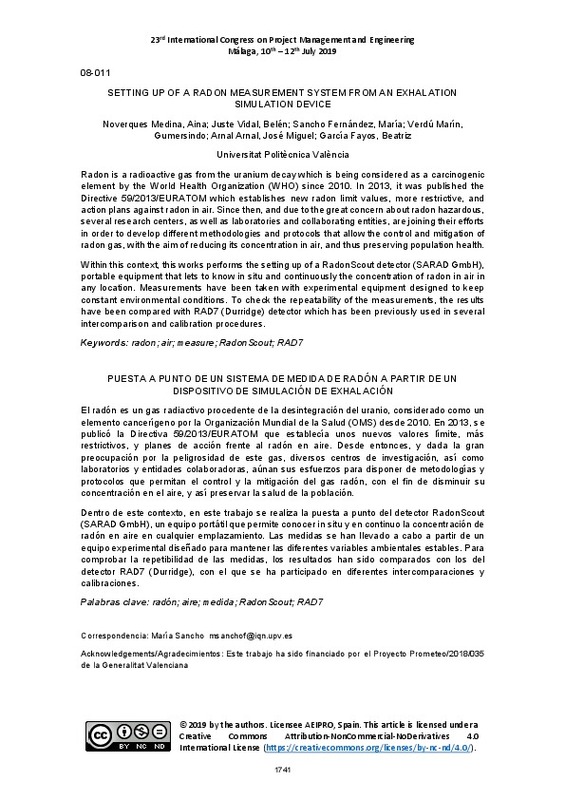JavaScript is disabled for your browser. Some features of this site may not work without it.
Buscar en RiuNet
Listar
Mi cuenta
Estadísticas
Ayuda RiuNet
Admin. UPV
Setting up of a radon measurement system from an exhalation simulation device
Mostrar el registro sencillo del ítem
Ficheros en el ítem
| dc.contributor.author | Noverques-Medina, Aina
|
es_ES |
| dc.contributor.author | Juste Vidal, Belen Jeanine
|
es_ES |
| dc.contributor.author | Sancho, M.
|
es_ES |
| dc.contributor.author | Verdú Martín, Gumersindo Jesús
|
es_ES |
| dc.contributor.author | Arnal Arnal, José Miguel
|
es_ES |
| dc.contributor.author | García-Fayos, Beatriz
|
es_ES |
| dc.date.accessioned | 2022-03-08T06:56:24Z | |
| dc.date.available | 2022-03-08T06:56:24Z | |
| dc.date.issued | 2019-07-12 | es_ES |
| dc.identifier.isbn | 978-84-09-13557-8 | es_ES |
| dc.identifier.uri | http://hdl.handle.net/10251/181287 | |
| dc.description.abstract | [EN] Radon is a radioactive gas from the uranium decay which is being considered as a carcinogenic element by the World Health Organization (WHO) since 2010. In 2013, it was published the Directive 59/2013/EURATOM which establishes new radon limit values, more restrictive, and action plans against radon in air. Since then, and due to the great concern about radon hazardous, several research centers, as well as laboratories and collaborating entities, are joining their efforts in order to develop different methodologies and protocols that allow the control and mitigation of radon gas, with the aim of reducing its concentration in air, and thus preserving population health. Within this context, this works performs the setting up of a RadonScout detector (SARAD GmbH), portable equipment that lets to know in situ and continuously the concentration of radon in air in any location. Measurements have been taken with experimental equipment designed to keep constant environmental conditions. To check the repeatability of the measurements, the results have been compared with RAD7 (Durridge) detector which has been previously used in several intercomparison and calibration procedures. | es_ES |
| dc.description.abstract | [ES] El radón es un gas radiactivo procedente de la desintegración del uranio, considerado como un elemento cancerígeno por la Organización Mundial de la Salud (OMS) desde 2010. En 2013, se publicó la Directiva 59/2013/EURATOM que establecía unos nuevos valores límite, más restrictivos, y planes de acción frente al radón en aire. Desde entonces, y dada la gran preocupación por la peligrosidad de este gas, diversos centros de investigación, así como laboratorios y entidades colaboradoras, aúnan sus esfuerzos para disponer de metodologías y protocolos que permitan el control y la mitigación del gas radón, con el fin de disminuir su concentración en el aire, y así preservar la salud de la población. Dentro de este contexto, en este trabajo se realiza la puesta a punto del detector RadonScout (SARAD GmbH), un equipo portátil que permite conocer in situ y en continuo la concentración de radón en aire en cualquier emplazamiento. Las medidas se han llevado a cabo a partir de un equipo experimental diseñado para mantener las diferentes variables ambientales estables. Para comprobar la repetibilidad de las medidas, los resultados han sido comparados con los del detector RAD7 (Durridge), con el que se ha participado en diferentes intercomparaciones y calibraciones. | es_ES |
| dc.description.sponsorship | Este trabajo ha sido financiado por el Proyecto Prometeo/2018/035 de la Generalitat Valenciana | es_ES |
| dc.language | Español | es_ES |
| dc.publisher | AEIPRO | es_ES |
| dc.relation.ispartof | Proceedings from the International Congress on Project Management and Engineering | es_ES |
| dc.rights | Reconocimiento - No comercial - Sin obra derivada (by-nc-nd) | es_ES |
| dc.subject | Radon | es_ES |
| dc.subject | Air | es_ES |
| dc.subject | Measure | es_ES |
| dc.subject | RadonScout | es_ES |
| dc.subject | RAD7 | es_ES |
| dc.subject | Radón | es_ES |
| dc.subject | Aire | es_ES |
| dc.subject | Medida | es_ES |
| dc.subject.classification | INGENIERIA QUIMICA | es_ES |
| dc.subject.classification | INGENIERIA NUCLEAR | es_ES |
| dc.title | Setting up of a radon measurement system from an exhalation simulation device | es_ES |
| dc.title.alternative | Puesta a punto de un sistema de medida de radón a partir de un dispositivo de simulación de exhalación | es_ES |
| dc.type | Comunicación en congreso | es_ES |
| dc.type | Capítulo de libro | es_ES |
| dc.relation.projectID | info:eu-repo/grantAgreement///PROMETEO%2F2018%2F035//BIOINGENIERIA DE LAS RADIACIONES IONIZANTES. BIORA/ | es_ES |
| dc.rights.accessRights | Abierto | es_ES |
| dc.contributor.affiliation | Universitat Politècnica de València. Departamento de Ingeniería Química y Nuclear - Departament d'Enginyeria Química i Nuclear | es_ES |
| dc.description.bibliographicCitation | Noverques-Medina, A.; Juste Vidal, BJ.; Sancho, M.; Verdú Martín, GJ.; Arnal Arnal, JM.; García-Fayos, B. (2019). Setting up of a radon measurement system from an exhalation simulation device. AEIPRO. 1741-1753. http://hdl.handle.net/10251/181287 | es_ES |
| dc.description.accrualMethod | S | es_ES |
| dc.relation.conferencename | 23rd International Congress on Project Management and Engineering (ICPME 2019) | es_ES |
| dc.relation.conferencedate | Julio 10-12,2019 | es_ES |
| dc.relation.conferenceplace | Málaga, España | es_ES |
| dc.relation.publisherversion | http://dspace.aeipro.com/xmlui/handle/123456789/2355 | es_ES |
| dc.description.upvformatpinicio | 1741 | es_ES |
| dc.description.upvformatpfin | 1753 | es_ES |
| dc.type.version | info:eu-repo/semantics/publishedVersion | es_ES |
| dc.relation.pasarela | S\407863 | es_ES |






